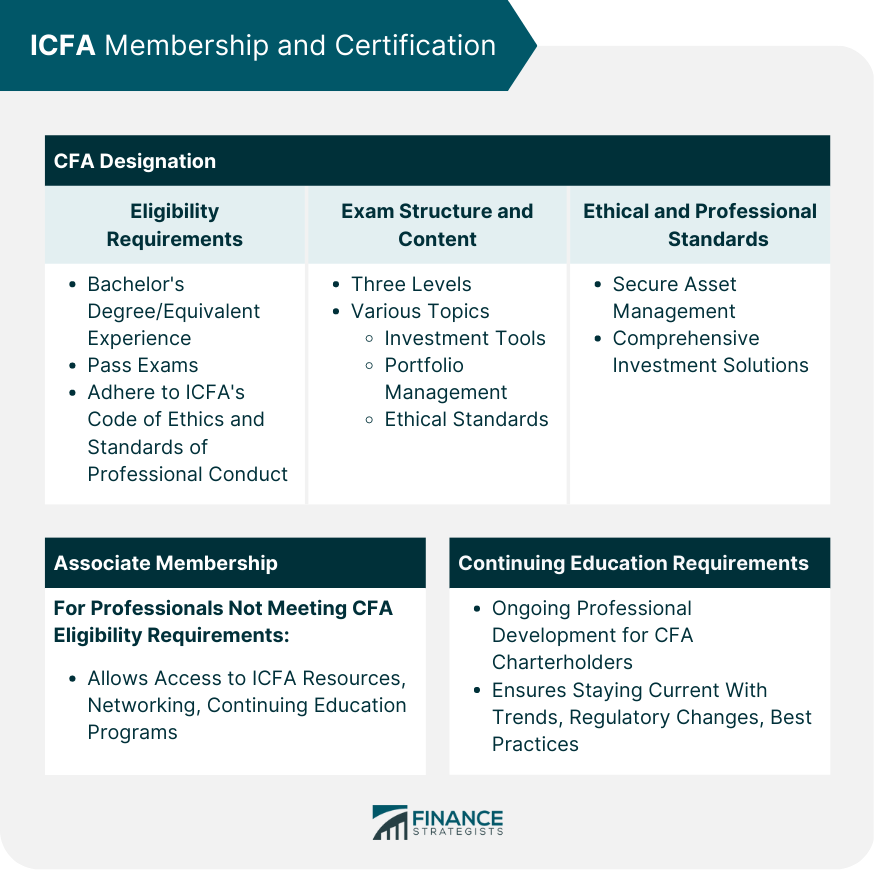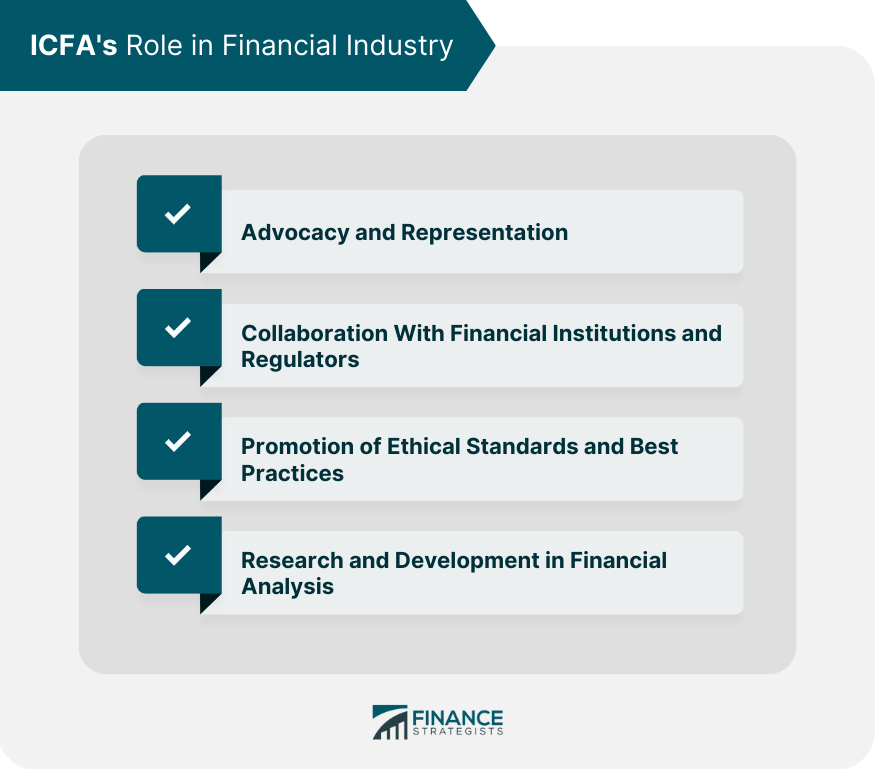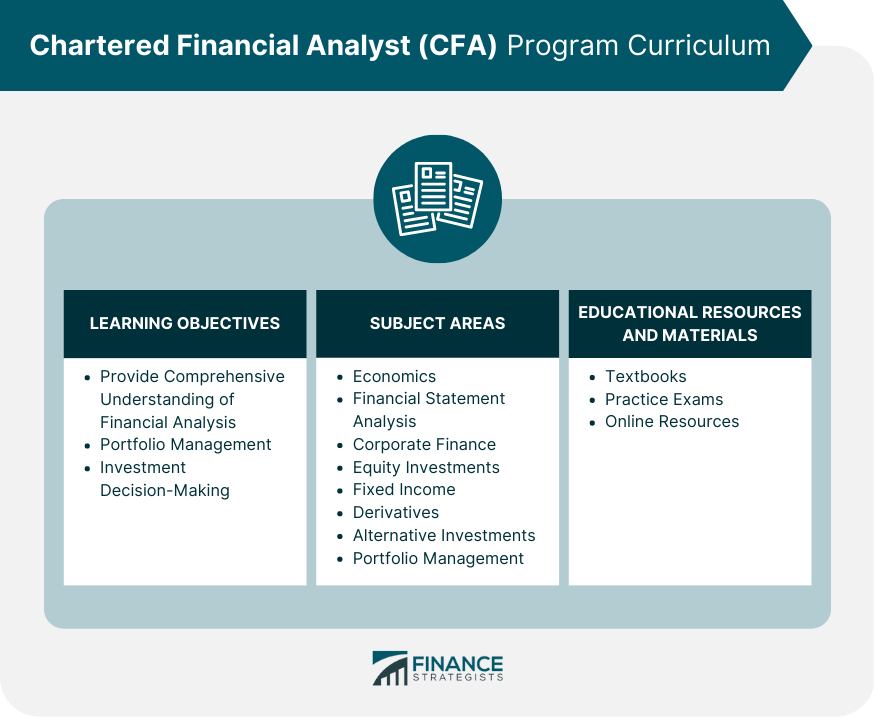The ICFA is a globally recognized professional organization dedicated to promoting the highest standards of financial analysis, investment management, and ethical conduct. The ICFA provides certification, education, and resources for finance professionals. The ICFA was founded in the 1960s in response to the growing need for a professional credential and standardized body of knowledge in the field of financial analysis. Since then, it has evolved into a highly respected global organization, attracting members from diverse backgrounds and industries. The primary purpose of the ICFA is to promote and uphold the highest standards of financial analysis and investment management through certification, education, and professional development. Its objectives include fostering ethical conduct, enhancing the financial industry's knowledge base, and advocating for its members' interests. To earn the CFA designation, candidates must hold a bachelor's degree or equivalent work experience, pass a series of rigorous exams, and adhere to the ICFA's Code of Ethics and Standards of Professional Conduct. The CFA exam is divided into three levels, each testing candidates' knowledge on various topics, such as investment tools, portfolio management, and ethical standards. The exams are designed to be increasingly challenging, requiring a deep understanding of financial analysis concepts. The ICFA emphasizes the importance of ethical and professional standards in the financial industry. CFA candidates and members are required to abide by the Code of Ethics and Standards of Professional Conduct, ensuring high levels of integrity and professionalism. Associate membership is available to finance professionals who do not yet meet the eligibility requirements for the CFA designation. This membership category allows access to ICFA resources, networking opportunities, and continuing education programs. CFA charterholders are required to engage in ongoing professional development to maintain their designation. This commitment to lifelong learning ensures that charterholders stay current with industry trends, regulatory changes, and evolving best practices. Membership in the ICFA and the CFA designation provides finance professionals with increased credibility, access to a global network of peers, and opportunities for career advancement. These benefits help charterholders stand out in the competitive financial industry. The ICFA acts as an advocate for its members and the financial industry as a whole, engaging with regulatory bodies and policymakers to ensure that industry interests are represented and protected. The ICFA collaborates with financial institutions and regulatory bodies to develop and promote best practices, strengthen the financial industry's resilience, and facilitate the sharing of knowledge and expertise. The ICFA actively promotes ethical standards and best practices in the financial industry, fostering a culture of integrity and professionalism that benefits both its members and the broader financial community. The ICFA supports research and development in financial analysis, contributing to the ongoing advancement of the field and ensuring that its members stay at the forefront of industry knowledge and expertise. The CFA Program curriculum is designed to provide candidates with a comprehensive understanding of the tools and concepts needed for successful financial analysis, portfolio management, and investment decision-making. The curriculum covers a wide range of subject areas, including economics, financial statement analysis, corporate finance, equity investments, fixed income, derivatives, alternative investments, and portfolio management. The ICFA provides candidates with various educational resources and study materials, such as textbooks, practice exams, and online resources, to help them effectively prepare for the CFA exams and develop a strong foundation in financial analysis. The ICFA offers a variety of professional development courses and seminars to help finance professionals enhance their skills, stay current with industry trends, and advance their careers. Through webinars and workshops, the ICFA provides members with opportunities to learn from industry experts, discuss emerging issues, and share insights and best practices with peers. The ICFA organizes networking events and conferences that bring together finance professionals from around the world to connect, share knowledge, and explore new ideas and trends in the financial industry. The ICFA has regional and local chapters worldwide, providing members with access to resources, networking opportunities, and educational events tailored to their specific geographic location and market. The ICFA collaborates with international financial organizations to foster cross-border partnerships, facilitate sharing knowledge and best practices, and promote global standards in financial analysis and investment management. Through cross-border initiatives and partnerships, the ICFA works to strengthen the global financial industry, promote the adoption of consistent standards and practices, and create opportunities for international collaboration and professional development. The financial landscape and regulatory environment continuously evolve, presenting challenges and opportunities for the ICFA and its members. Staying abreast of these changes is essential to maintain the relevance and value of the CFA designation. Technology and digitalization are transforming the financial industry, requiring the ICFA and its members to adapt and embrace new tools, techniques, and analytical approaches to remain competitive and effective in their roles. The ICFA is committed to promoting diversity and inclusion within the financial industry, recognizing the value of diverse perspectives and experiences in driving innovation and improving decision-making. As the financial industry continues to evolve, the ICFA and its members must stay ahead of emerging trends and seize opportunities to shape the future of financial analysis and investment management. The Institute of Chartered Financial Analysts plays a critical role in promoting the highest standards of financial analysis and investment management, providing certification, education, and resources for finance professionals around the world. Chartered Financial Analysts are essential to the financial industry, bringing a high level of expertise, professionalism, and ethical conduct to their roles, ultimately benefiting the broader financial community and the economy as a whole. The ICFA remains committed to upholding and advancing excellence in the field of financial analysis, fostering a culture of ethical conduct, and providing its members with the tools and resources they need to succeed in the ever-changing financial landscape. As you navigate the complex world of finance and investment, consider seeking the help of a qualified financial advisor. A professional with the CFA designation brings valuable expertise, ethical standards, and industry knowledge to guide you in making informed financial decisions. Trust in the competence and integrity of a Chartered Financial Analyst to help you achieve your financial goals and secure your financial future.What Is the Institute of Chartered Financial Analysts (ICFA)?
ICFA Membership and Certification
Chartered Financial Analyst (CFA) Designation
Eligibility Requirements
Exam Structure and Content
Ethical and Professional Standards
Associate Membership
Continuing Education Requirements

ICFA's Role in Financial Industry
Advocacy and Representation
Collaboration With Financial Institutions and Regulators
Promotion of Ethical Standards and Best Practices
Research and Development in Financial Analysis

ICFA's Educational Programs and Resources
CFA Program Curriculum
Learning Objectives
Subject Areas
Educational Resources and Study Materials

Professional Development Courses and Seminars
Webinars and Workshops
Networking Events and Conferences
Global Presence and Affiliates
Regional and Local Chapters
Collaboration With International Financial Organizations
Cross-Border Initiatives and Partnerships
Challenges and Future Prospects
Evolving Financial Landscape and Regulatory Environment
Impact of Technology and Digitalization
Ongoing Efforts to Promote Diversity and Inclusion
Future Trends and Opportunities in the Field of Financial Analysis
Final Thoughts
Institute of Chartered Financial Analysts (ICFA) FAQs
The primary purpose of the ICFA is to promote and uphold the highest standards of financial analysis and investment management through certification, education, and professional development. Its objectives include fostering ethical conduct, enhancing the financial industry's knowledge base, and advocating for its members' interests.
To become a member of the ICFA, you need to pursue the Chartered Financial Analyst (CFA) designation, which requires a bachelor's degree or equivalent work experience, passing a series of rigorous exams, and adhering to the ICFA's Code of Ethics and Standards of Professional Conduct. Alternatively, you can apply for associate membership if you do not yet meet the eligibility requirements for the CFA designation.
The ICFA offers a range of educational programs and resources, including the comprehensive CFA Program curriculum, professional development courses, seminars, webinars, and workshops. Additionally, they provide networking events and conferences to help finance professionals enhance their skills, stay current with industry trends, and advance their careers.
The ICFA contributes to the global financial industry through advocacy, collaboration with financial institutions and regulators, promotion of ethical standards and best practices, and research and development in financial analysis. The ICFA also fosters cross-border initiatives and partnerships, collaborating with international financial organizations to promote global standards and share knowledge.
Financial advisors with the CFA designation from the ICFA have demonstrated a high level of expertise, professionalism, and ethical conduct in the field of financial analysis and investment management. By seeking help from a CFA-affiliated financial advisor, you can trust in their competence and integrity to guide you in making informed financial decisions and achieving your financial goals.
True Tamplin is a published author, public speaker, CEO of UpDigital, and founder of Finance Strategists.
True is a Certified Educator in Personal Finance (CEPF®), author of The Handy Financial Ratios Guide, a member of the Society for Advancing Business Editing and Writing, contributes to his financial education site, Finance Strategists, and has spoken to various financial communities such as the CFA Institute, as well as university students like his Alma mater, Biola University, where he received a bachelor of science in business and data analytics.
To learn more about True, visit his personal website or view his author profiles on Amazon, Nasdaq and Forbes.











